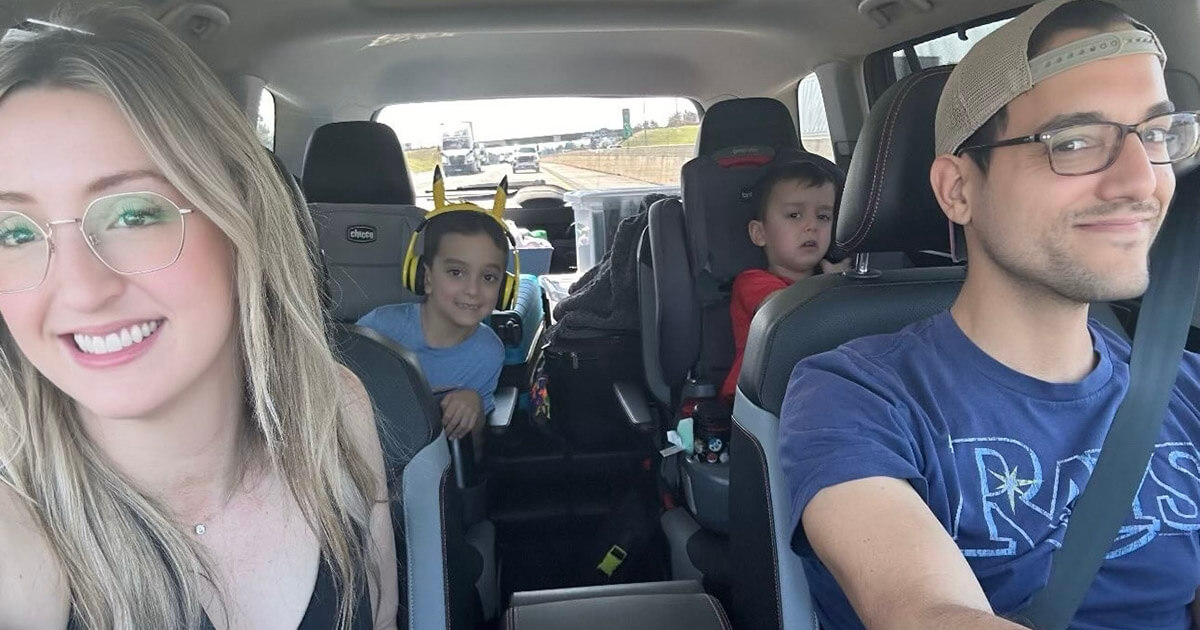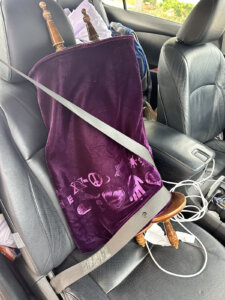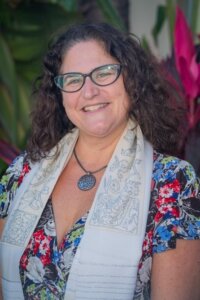Hurricane Milton forces Florida Jews to rethink Yom Kippur plans
As the hurricane tracks toward St. Petersburg and Tampa, Jews and rabbis seek higher ground for the High Holidays

The Feld family — from left: Jennifer, Kameron, Micah and Eric — driving from Tampa to Atlanta to escape Hurricane Milton. Courtesy of Feld family
Rabbi Amy L. Morrison of Temple Beth-El in St. Petersburg, Florida, grabbed her son, Ezra; and their two kittens, Bean and Monkey. They crammed into their hybrid Kia Niro to flee Hurricane Milton, evacuating ahead of what could be Tampa Bay’s strongest storm in a century.
Josh Gamson, the synagogue’s director of teen and youth engagement, evacuated the synagogue’s six Torah scrolls.
With Yom Kippur beginning at sundown Friday, Morrison had arranged for her congregants at Temple Beth-El in St. Petersburg, Florida, to attend services for free at eight synagogues in safer cities across the southeast — Atlanta, Miami, Birmingham, Alabama, and Tallahassee, Florida. Some of the shuls have also donated money to help with the inevitable recovery efforts.

“It’s been really touching and humbling,” said Morrison, 46, who started working at Beth-El, which is Reform, this summer and is now hunkering down in her former hometown, Miami.
Milton barreled towards the west coast of Florida at 175 miles per hour on Tuesday and was expected to make landfall late Wednesday night. Experts are warning of up to 12 inches of rain, and storm surges as high as 15 feet. Some areas are under mandatory evacuation orders. “We are telling people,” said one local meteorologist, “this will be like the worst hurricane in their lifetime.”
All of this comes less than two weeks after Hurricane Helene battered the region. More than 90% of FEMA workers are responding to other natural disasters, leaving those in Milton’s path left to worry and wonder how they will cope. “I lived in Miami for 20 years,” Morrison told me, “and didn’t face what we faced in the last two weeks in St. Pete with these two storms.”
Hurricane evacuees take Legos — and a tallit
About 250 miles north — somewhere outside Tifton, Georgia — Tampa natives Jennifer and Eric Feld drove through congested traffic on I-75 Tuesday bound for Atlanta. In the back seat of their Volkswagen Atlas were their two sons, Kameron, 7, and Micah, 4, who, given the unique circumstances, were given permission to eat snacks, watch movies and play games on their iPads. “All rules are off in the car,” Jennifer Feld, 37, said as she looked under the seat in search of a missing Lego. “Whatever they want to do.”
In the trunk were family heirlooms, including a tallit that has been passed down for at least three generations. “You have to prepare to not return home,” she said. “It’s a very surreal experience.”
They will be spending Yom Kippur in Sandy Springs, an Atlanta suburb, with friends who live a short walk from Beth Tefillah, a large Chabad congregation. The friends have secured seats for the Felds, and have talked up the programming for the kids. It will be a more traditional service than the Felds are used to at Tampa’s Reform Congregation Schaarai Zedek. “We’re not afraid of a mechitza,” laughed Feld, referring to a divider separating men and women.
The day before evacuating Tampa, the Felds took their sons to recite tashlich, the prayer said around Rosh Hashanah in which Jews toss bread into a body of water to symbolically wash away the previous year’s sins. “We intertwine Jewish values into everything that we do,” said Feld, who is president of the board of Tampa Jewish Family Services. “We try to teach them what’s important, and to be thankful for what we have.”
‘Strangest Yom Kippur since the pandemic’
Rabbi Phil Weintraub of Congregation B’nai Israel in St. Petersburg arrived in Atlanta late Sunday night with his wife, Rebecca, and their two daughters Hannah, 12, and Eliana, 8. Also in tow was Schuyler, their 4-year-old goldendoodle.

They’re staying with Weintraub’s parents, and the rabbi plans to record on Friday an abridged version of the Yom Kippur sermon he’d planned, and email it to his shul’s 350 families. The message still applies. “It’s about the Jewish concept of tikvah, hope and caring for one another,” he said. “We have shown our resiliency as a Jewish community in innumerable ways this year.”
Weintraub said that the United Synagogue of Conservative Judaism, the umbrella group to which his congregation belongs, has offered free High Holiday tickets to any synagogue in Atlanta for those displaced by the hurricane.
He added: “This is probably the strangest Yom Kippur since the pandemic.”
Between the anniversary of the Oct. 7 Hamas attack, Hurricane Helene and now Milton, Weintraub, 40, said he has had trouble sleeping recently. When he wakes up at 2 a.m., he writes poetry, which he’s been posting to Instagram. “Emotions swirling, mind is churning,” he wrote Monday. “Praying that those who lost so much, need not fear the water’s rush.”
When will Hurricane Milton evacuees return home?

Rabbi Morrison is hoping to return home to St. Pete as soon as possible, and plans to host a belated Yom Kippur service at her synagogue next week. “It’s not traditional, and I’m positive my colleagues will have a lot to say,” she acknowledged. “Although Yom Kippur is a biblically defined day, it is also a feeling.”
The Felds, meanwhile, are taking a wait-and-see approach. With so many people fleeing Tampa Bay and extensive damage expected, they are already mulling what staying in Atlanta for a month or two could look like — maybe renting an Airbnb and temporarily enrolling the boys at one of the local Jewish elementary schools.
“Everyone has their storm,” Feld said. “Naples had Ian. Milton is our storm. Which is kind of fitting, because it’s the name of an old Jewish man.”
Correction: The original version of this article misstated who evacuated the Torahs from Temple Beth-El. It was Josh Gamson, the shul’s director of teen and youth engagement, not Rabbi Amy L. Morrison.















